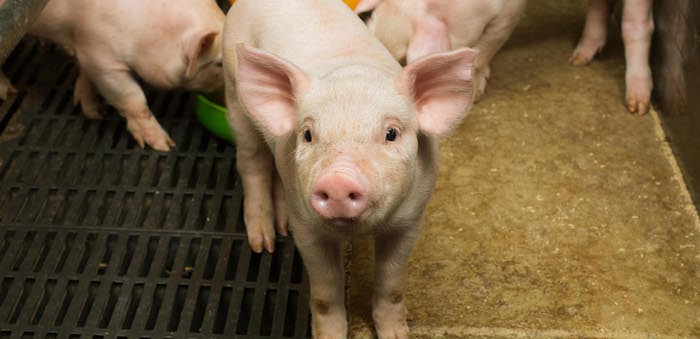The Prime Minister has waded into the row over the Government’s position on animal sentience, following a Commons vote last week.
As the controversy threatened to spin out of control, Theresa May told MPs during Prime Minister’s Questions on Wednesday that the Government ‘recognises and respects the fact that animals are sentient beings and should be treated accordingly’.
She said: “The Animal Welfare Act 2006 provides protection for all animals capable of experiencing pain or suffering which are under the control of man. But I reaffirm tthat we will be ensuring that we maintain and enhance our animal welfare standards when we leave the EU.”
Last week’s vote prompted a major backlash after Green MEP Caroline Lucas submitted an amendment which sought to transfer the EU Protocol on animal sentience into UK law. The new clause was rejected with a majority of 18 for the Government.
During last week’s eight-hour Commons debate, Justice Minister Dominic Raab said the Government supported the principle behind the proposed clause but ‘cannot accept it’.
The reference to animals as sentient beings is already recognised as a matter of domestic law, primarily in the Animal Welfare Act 2006, he said.
“If an animal is capable of experiencing pain and suffering, it is sentient and therefore afforded protection under that Act,” he said.
“We have made it clear that we intend to retain our existing standards of animal welfare once we have left the EU and, indeed, to enhance them. The vehicle of this legislation will convert the existing body of EU animal welfare law into UK law. It will make sure that the same protections are in place in the UK and that laws still function effectively after the UK leaves the EU.
“In this country—we should be proud to say this—we have some of the highest animal welfare standards in the world, and we intend to remain a world leader in the future. Leaving the EU will not prevent us from further maintaining such standards; in fact, it will free us in some regards to develop our own gold-standard protections on animal welfare.”
It is understood there was concern within Government that the direct transfer of the EU regulation on the issue would restrict the further development of animal welfare standards in the UK.
NPA chief executive Zoe Davies said: “There has been a lot of froth about this and it is largely based on a misunderstanding. If anything, the Government is looking to raise animal welfare standards.
“We as an industry remain hugely proud of our high animal welfare standards and are campaigning hard to ensure they are maintained, and not diluted, on the global market after we leave the EU.”
Reaction to the vote
Responding to the decision, British Veterinary Association Senior Vice President Gudrun Ravetz said:
“It is extremely concerning that a marginal majority of MPs have voted-down this seminal clause. Enshrining animal sentience in UK law would have acknowledged that we consider animals as being capable of feelings such as pain and contentment and, so, deserving of consideration and respect. It is a founding principle of animal welfare science, and for the way that we should treat all animals.
“As an animal welfare-led profession, BVA has been calling on government to at least maintain current standards of animal health and welfare and public health. Yet actions speak louder than words, and this action undermines the Government’s previous promises that the UK will continue to be known for our high standards of animal health and welfare post-Brexit.
The RSPCA also condemned the move. RSPCA Head of Public Affairs David Bowles said: “It’s shocking that MPs have given the thumbs down to incorporating animal sentience into post-Brexit UK law. This is truly a backward step for animal welfare.
“Animal sentience is never mentioned in the Animal Welfare Act and, crucially, only domestic animals are really covered by the provisions of the Act anyway and animals in the wild and laboratories are expressly exempt. It is simply wrong for the Government to claim that the Act protects animal sentience.”
Soil Association CEO Helen Browning said: “This decision is a huge backwards step that will ring alarm bells across this nation of animal lovers. The Government has repeatedly promised that farm animal welfare standards will not be lowered post Brexit, yet reducing the status of animals by denying their sentience paves the way for this.
“No livestock farmer or pet owner would ever be persuaded that their animals are not capable of suffering, or capable of feeling.”




